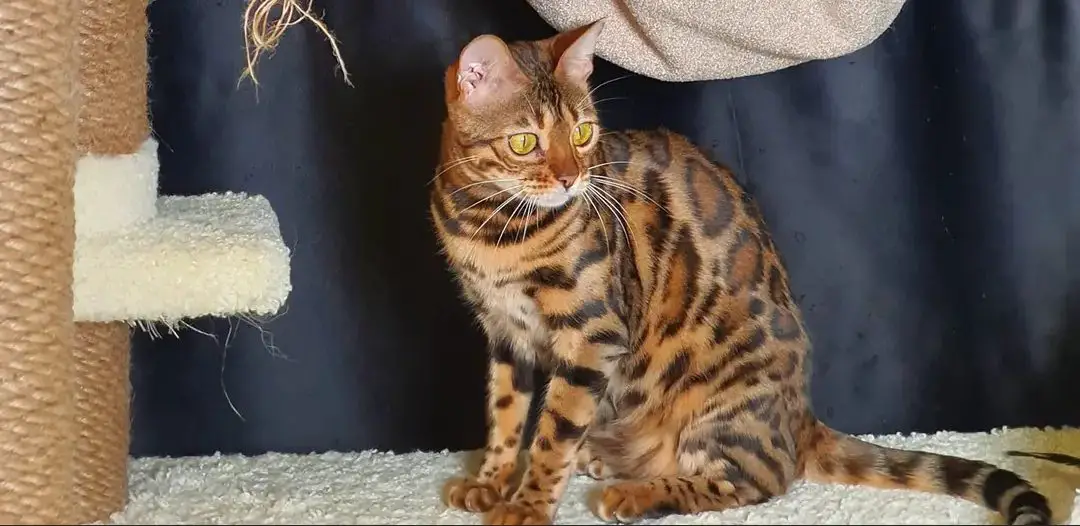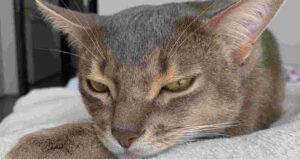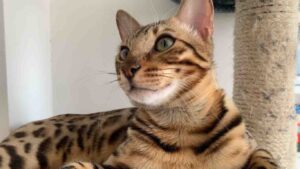Are you considering getting a Bengal cat? Before you make that leap, let me share some insider insights on why you might want to think twice.
From their high energy levels to their need for constant stimulation, discover the reasons why Bengal cats may not be the right fit for everyone.
Buckle up, because this is about to get wild!
Note: This post is not to discredit Bengal cats, as they are special cats, however, this post will point out somethings you need to know before getting a Bengal cat.
Let’s get started…
Why You Shouldn’t Get a Bengal Cat
While Bengal cats are undeniably beautiful and captivating, there are a few factors to consider before bringing one into your home.
Firstly, their high energy levels demand constant mental and physical stimulation, which may be challenging for some individuals.
Additionally, their strong hunting instincts can create conflicts with other pets, potentially disrupting the harmony of your household.
Lastly, their unique needs and requirements may be better suited for experienced cat owners who can provide the necessary care and environment.
Let’s break it down for better understanding…
Here are some of the reasons why you shouldn’t get a Bengal cat:
1. High Energy Levels and Space Requirements
Bengal cats are known for their boundless energy, this can quickly become a problem for most owners.
They are incredibly active and require ample physical and mental stimulation to stay content, which most owners might not be able to cope with.
If you live in a small apartment or lack sufficient space for them to explore and roam around, a Bengal cat may not be the best choice for you.
These cats love to climb, jump, and play, so providing them with a stimulating environment that includes cat trees, interactive toys, and designated play areas is crucial.
Failure to meet their exercise and space requirements can lead to frustration, boredom, and potential behavioral issues.
2. Potential for Destructive Behavior
Due to their high energy levels and innate curiosity, Bengal cats have a tendency to engage in destructive behavior when they don’t receive adequate mental and physical stimulation.
They may scratch furniture, knock over objects, or engage in excessive vocalization if they feel bored or confined.
It’s essential to provide them with enriching activities and outlets for their energy, such as puzzle toys or interactive play sessions.
However, if you have valuable or delicate belongings that you can’t risk being damaged, you may need to reconsider bringing a Bengal cat into your home.
3. Territorial Nature
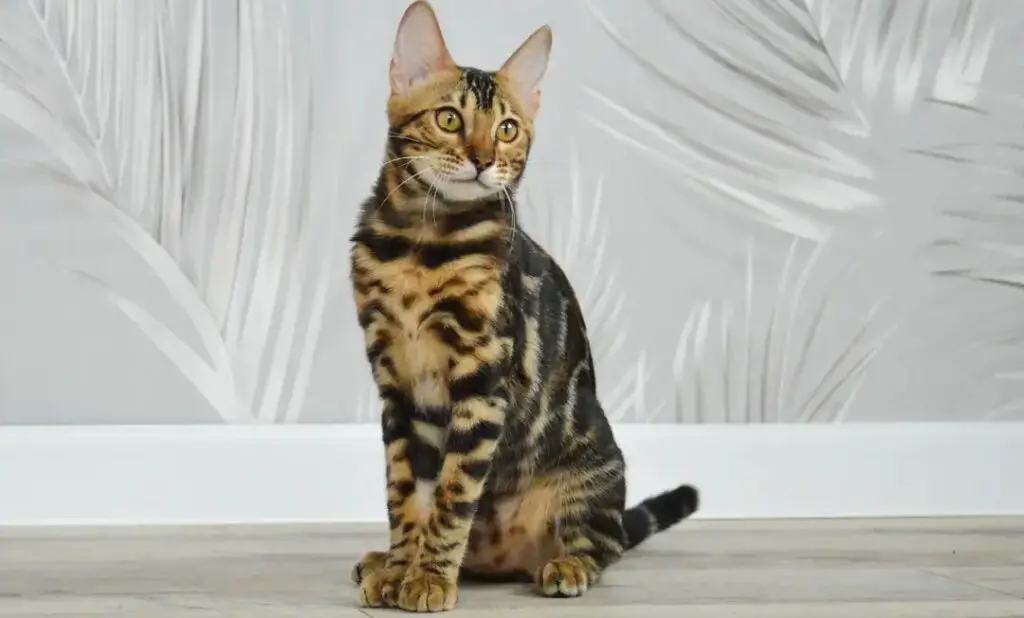
Bengal cats have a strong sense of territory and may exhibit territorial behaviors, which can become a problem for most owners.
They tend to bond closely with their human companions but can be wary of strangers or unfamiliar animals.
This territorial nature can manifest as aggressive behavior towards other pets or even humans who encroach upon their perceived territory.
Proper socialization from an early age can help mitigate this behavior, but it requires time, patience, and consistent effort.
If you have a busy household with frequent visitors or other pets, a Bengal cat’s territorial tendencies may pose challenges and require careful management.
4. Strong Prey Drive
Bengal cats have retained their wild ancestors’ instincts, including a strong prey drive.
They have an innate desire to hunt and pounce, which can create challenges in a multi-pet household, particularly if you have smaller animals like birds or rodents.
Their hunting instincts may also extend to smaller objects or even insects, leading to potential hazards if they accidentally ingest something harmful.
Additionally, their prey drive can make it challenging to introduce them to outdoor environments safely and can also be a problem for owners.
It’s crucial to provide them with appropriate outlets for their hunting instincts, such as interactive toys and supervised play sessions, to avoid potential conflicts or accidents.
5. Messy and Aggressive Behavior
Bengal cats are known for their active and energetic nature, which can sometimes manifest as mischief and messiness.
Due to their high energy levels, they may engage in more destructive behaviors compared to other domesticated cats.
This can include knocking over objects, scratching furniture, or even climbing curtains, this can quickly become messy for some owners.
Additionally, Bengals have a strong predatory instinct, which may lead to aggressive behavior towards smaller pets or even their human companions.
While proper training and socialization can help mitigate these tendencies, it’s important to be prepared for a potentially rowdy and occasionally aggressive feline friend.
6. They Can’t Be Left Alone
Bengal cats thrive on interaction and companionship. Leaving them alone for extended periods can lead to feelings of boredom and loneliness, which may result in behavioral issues.
These cats require mental stimulation and playtime to keep them entertained and prevent destructive behaviors.
If you have a busy lifestyle or frequently travel, it might be challenging to provide the level of attention and engagement that a Bengal cat requires.
Keep in mind that neglecting their social needs can result in a stressed and unhappy pet.
7. Talkative and Nocturnal
If you’re the type of person who enjoys peace and quiet during the evenings, a Bengal cat might not be the best choice for you.
Bengals are known to be quite talkative and vocal, expressing themselves through a range of sounds, including chirps, meows, and even trills.
Their nocturnal nature means they can be especially active during the night, which can disrupt your sleep patterns.
If you’re a light sleeper or need a quiet environment during nighttime hours, you might find their vocalization and nighttime antics to be a bit overwhelming.
8. Hyperactive Chaos Lovers
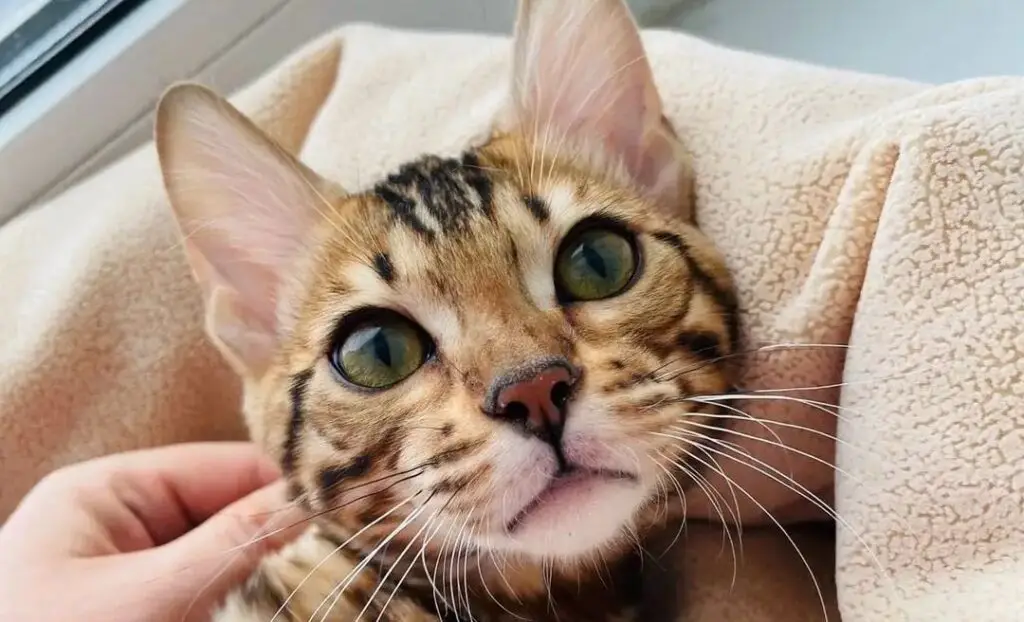
Bengal cats are renowned for their boundless energy and playfulness. They are hyperactive creatures that love to run, jump, and explore.
While this can be entertaining and endearing, it can also create an environment of chaos in your home.
Bengals have been known to engage in acrobatic feats, climbing to great heights and darting around with lightning speed.
This level of hyperactivity may not be suitable for everyone, especially those who prefer a more serene and low-key lifestyle.
9. Not Suitable for Cold Regions
If you live in a cold region or are accustomed to chilly weather, you might need to think twice before getting a Bengal cat.
These cats originate from warmer climates like India, where they developed a thick coat to protect them in tropical environments.
While their coat is undoubtedly beautiful, it may not provide sufficient insulation in colder climates, and this can become a problem for them.
Bengal cats are more susceptible to discomfort and health issues in colder temperatures.
They may struggle to regulate their body temperature and could be prone to respiratory problems or even hypothermia.
If you live in a cold region, it’s crucial to provide your Bengal cat with proper heating, warm bedding, and minimize their exposure to the cold.
However, keep in mind that even with these precautions, your Bengal may still not thrive in cold weather.
10. Expensive Cost of Ownership
When considering the cost of owning a Bengal cat, it’s essential to look beyond the initial purchase price.
Bengal cats are a relatively exotic breed and are in high demand due to their striking appearance.
As a result, they tend to come with a higher price tag compared to other domestic cat breeds.
However, the upfront cost is just the tip of the iceberg. Bengal cats often require high-quality, specialized diets to maintain their health and well-being.
Additionally, routine veterinary care, vaccinations, and preventative treatments should also be factored into your budget.
Moreover, due to their active nature, Bengal cats may require more toys, scratching posts, and environmental enrichment to keep them entertained and prevent destructive behavior.
11. Need Regular Exercise and Mental Stimulation
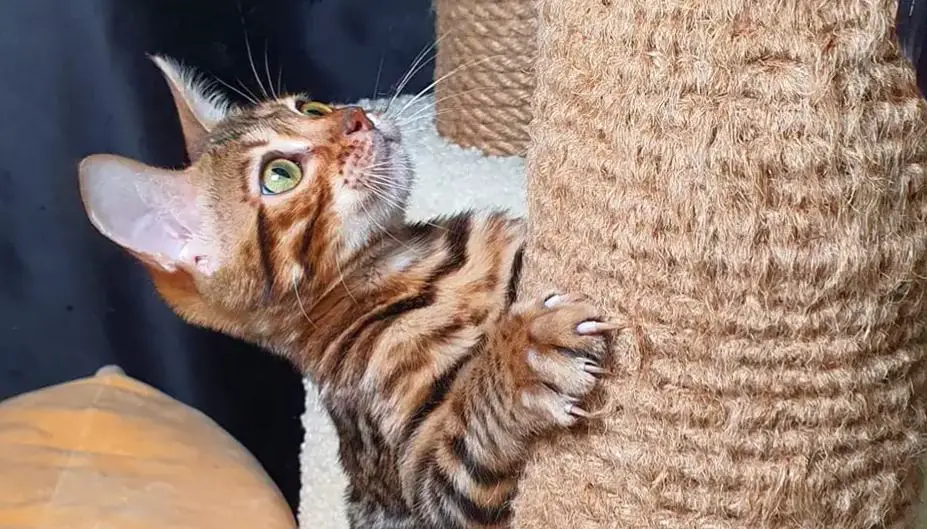
Bengal cats are known for their high energy levels and active nature. They have retained their wild ancestors’ traits and have a natural instinct to explore, climb, and play extensively.
As a result, they require ample physical exercise and mental stimulation to stay healthy and content.
If you’re considering a Bengal cat, be prepared to dedicate time each day to engage them in interactive play sessions.
This can include activities like puzzle toys, feather wands, and even teaching them tricks or agility exercises.
Without adequate exercise and mental stimulation, Bengal cats can become bored, frustrated, and may develop behavioral problems such as aggression or excessive scratching.
12. Certain Health Concerns
While Bengal cats are generally healthy, there are a few health concerns that potential owners should be aware of.
One of the most common issues is a genetic condition called progressive retinal atrophy (PRA), which can cause gradual vision loss and potentially lead to blindness.
Additionally, some Bengals may have a higher risk of developing hypertrophic cardiomyopathy (HCM), a condition that affects the heart muscle.
Regular veterinary check-ups and genetic testing can help mitigate these risks, but it’s essential to consider the potential health concerns before committing to a Bengal cat.
Related: Why Bengal cats are special
Conclusion
Before you decide to bring a Bengal cat into your home, it’s essential to consider the unique challenges they present. From their high energy levels to their need for constant stimulation, Bengal cats require a dedicated and experienced owner. So, think twice before adopting a Bengal cat and ensure it’s the right choice for you and your lifestyle.
Questions
Let me answer some questions:
Are Bengal cats suitable for first-time cat owners?
While Bengal cats are beautiful and exotic, they are not recommended for first-time cat owners due to their high energy levels, demanding nature, and need for constant stimulation.
Do Bengal cats require a lot of attention and interaction?
Yes, Bengal cats are highly active and social creatures that crave attention and interaction. They may become bored or destructive if left alone for long periods of time, so they require a dedicated and involved owner.
Are Bengal cats low-maintenance pets?
No, Bengal cats are not low-maintenance. They have specific needs that require time, effort, and resources, including regular exercise, mental stimulation, and a proper diet. Neglecting these needs can lead to behavioral issues.
Do Bengal cats get along well with other pets?
While it depends on the individual cat’s personality and upbringing, Bengal cats generally have a strong prey drive and may not get along well with other small animals or even some dogs. Proper introductions and supervision are crucial when introducing them to other pets.

